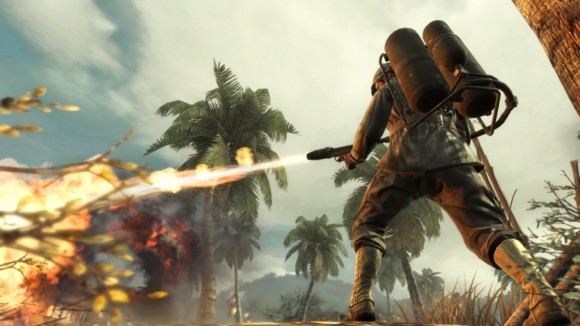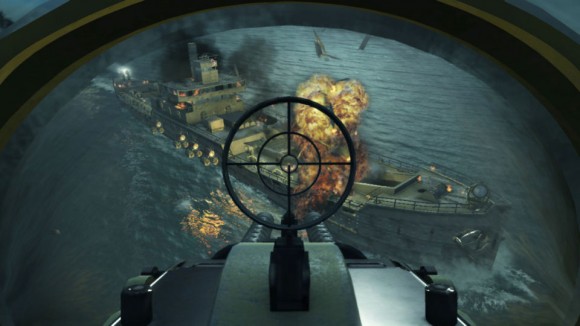Call of Duty: World at War is a game about the Second World War. Though it’s several years old it’s decidedly under-patched, and because it’s several years old multiplayer is broken. However, you can easily snag the game for 20 bucks or less. Unfortunately, you’re pressured to pay 25 bucks for all DLC. I seriously recommend you avoid this game, except as a rental.
But that’s not important. I’m not trying to get you to buy the game. Instead I want to talk about its story, or rather its setting.
The game is composed of idiocy: simple and mildly interesting characters; dialogue that’s used like there’s a tax on it; obvious bugs and ridiculousness; the bulk of the game is centered around the incessant massacre of incompetent Japanese and German soldiers who are all evil; and after all that you reach the fake-death inherent to the genre (bullets are not bullets; they represent the idea of getting shot. Bullets are a metaphor for bullets). The game has obviously been designed by a jackass.
The game holds the player up as an unparalleled force of power, destruction and moral righteousness . It never quite bothers to justify your actions, but it does explain how evil those other guys are. As such it manifests the archetypical murderfest-for-America ideology that critics love to point at with jeers, and that the Parent-Teacher Association blames for their children’s failures.
World at War is simple and plastic, and – as a corollary to my earlier non-recommendation – it sucks; not only in terms of its stupidity but, and to a lesser extent, in terms of its mechanical game-ness. Mind-numbing but occasionally gratifying missions accompanied by well-executed controls and pre-Halo AI make for good rental material. Multiplayer, on the other hand, is dominated by 7th-prestige players, hackers and DLC maps that regularly kick out half the lobby.
Still, beyond all of this obvious shallowness and lack of thought, the game is strangely consistent in its tone. Darkness, destruction and revenge characterize the Russian campaign. Abandonment, grim determination and hollow victories color the American campaign. Racism, death, and all manner of horribleness permeate both. Any evil-doing by the good guys is displayed but quietly ignored. Any good done by anyone feels shallow and unheralded. It’s like the American who designed this knew which side to root for, but couldn’t quite work up the effort.

Despite all the obvious stupidity and numerous shortcomings, World at War manages to do something brilliant, if purely by accident. It represents the odd mixture of focus and surrealism in a veteran’s memory.
Let’s start with the massive memory gaps. Take, for instance, a level where Americans assault a Japanese airbase. A battle that clearly takes weeks is condensed into about the time it takes to watch an episode of Friends. A strategic flanking manoeuvre through a swamp takes players five minutes to traverse, ambush included. It’s a bit backwards, given that memory gaps develop during life-and-death scenarios, (marching and waiting is what’s most easily remembered, if old war vets are to be believed) but it supports the reading of the game as a memory.
Then we jump into the traditionally-reviled CoD trope; non-death. Your character is shot up on a regular basis but never really feels it. The avatar occasionally dies but pops right back into the action. Death is sombre but meaningless. Following my argument, an old war vet is remembering or dreaming his time in service, and occasionally diverts into thoughts or  nightmares of all the hundreds of moments in which he could have died.
There are also the names that float over character’s heads; these signs mark the people that the protagonist remembers. Enemies are never given names and so are dehumanised; they aren’t worth the effort of remembering. Allies possess a name as long as they’re alive; when they die, one is left with a vague impression of who they were shortly before, but in the heat of the moment it no longer matters. Only a small group of close friends in the same squad as you are remembered after they die; the only people worth remembering.
Next is the game’s linearity. It’s very linear. I’ve expounded on my ideas around this topic before; a brief summary amounts to ‘if a game offers you different paths but hints that one in particular is ‘right,’ then that path is the only one that really exists.” In relation to World at War, I have to assume that the game is hinting toward the idea that it would’ve been so easy to have done something else, and to have fought a different fight, but only this exact set of events took place.
Finally, every participant in these events is batshit crazy. Enemies are stupid, officers are absent (or barking senseless and often suicidal orders) and no one ever has a good reason to fight (they either simply have to, in the case of the Americans, or have revenge as their only remaining possession, in the case of the Russians). What’s more if an NPC dies it’s almost always because he did something completely stupid (read: men died in front of me for the most easily prevented of reasons). Sound like The Thin Red Line yet?

Realistically, there’s no way that the player-protagonist killed the hundreds of men he thinks he did. To spin this mechanic, one need merely look at the difference between a sniper and an infantryman. A sniper always knows who he kills. Without knowing who killed who, a soldier can easily see every body he comes across as someone he put down, every one of the them with one of the same three faces and costumes.
World at War has a conspicuously hollow way of rewarding the player’s actions. Besides the probably-imagined massacre of hundreds of soldiers, both German and Japanese, all important roles for and actions by the player are given, like a favor. “Petrenko, the tanks can’t advance, destroy those cannons!” “Miller! Take out those tanks!” “Miller, I’ll wait for you to use the explosives in my hand to destroy the ammo dump I’m standing next to!” In all but a few instances absolutely any soldier could have done what the player did, and the protagonist was simply lent a role in ending the war.
At the end of the sorrowful American campaign the characters aren’t overjoyed that they won, or that people can rebuild once the fighting is done. They don’t even offer insightful comments on the meaning of war. The surviving Americans are tired and sore. The corporal -one of the two surviving members of the squad- merely whispers that it’s over. His “we won!” is accompanied by a raised rifle, and aimed at the bodies of the last Japanese defenders; it’s really just a “fuck you!” in disguise.
At the end of the Russian campaign the commander praises the protagonist as the “heart of the Soviet army,” comments on the greatness of Mother Russia, and says that the both of them will return as heroes. However, the sequel – and the history books – explains that “Stalin had little need for heroes.” And we all know what happened to Mother Russia.
And then, when you finish the game, and the credits roll, the game dumps you into hell. No, not that hell. Not the climax of the hero’s journey hell. Like, hell hell. Hell is written on the wall, hell. Just like the Russians in Cossacks 2 that occasionally do really stupid things, you can’t tell me that Nazi Zombies doesn’t mean something.
Comments
3 responses to “Memories of the World at War”
As AJ mentioned elsewhere, I think that you could make similar arguments about other Call of Duty games – I suppose CoD 3 is the best point of comparison as it's another WW2-set CoD game, and it's similarly linear, faceless and improbable. I've not played World at War but I would wager that one thing it does have over CoD 3 is a surfeit of melodrama? That's the way the series has been going.
Anyway, I think my favourite observation in this piece is around the contraction of time and events. As the old apocryphal saying goes, war is months of boredom punctuated by moments of pure terror. CoD aims to dispose of the boredom and supplant terror with excitement.
But then I suppose CoD isn't ARMA or Flashpoint; it's not trying to represent real warfare. It's trying to represent a war movie in which you are a participant. And I'm sure a lot of the points in your argument above could also be applied in a broad sense to many war films.
I would recommend reading Philip Caputo's 'A rumor of War' as a counterpoint. It is an excellent piece written by a combatant of the Vietnam war who later became a journalist. It covers conflict in a way that The Hurtlocker wishes it could.
Oh sweet SEGA I want to play Dragon Rising so bad.
Holy Super Nintendo Entertainment System Batman!
I've read a few short stories from war vets. Always with the lopsided amounts of focus; always. But, in short, I don't have much experience with actual recollections (my dad and both grandpas were in the military, but none ever fought. Apparently, my father's father was cooking on d-day, and because of all the secrecy involved, he came out of the kitchen to find the mess-hall completely empty.)
I'll definitely get right on that, though.
Oh, and I keep meaning to mention it: I see smiley. He cannot hide from me.